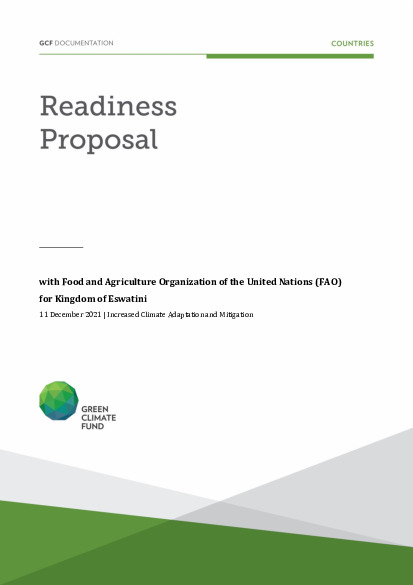Laying the foundations for increased climate adaptation and mitigation in Eswatini’s Agricultural Sector

Laying the foundations for increased climate adaptation and mitigation in Eswatini’s Agricultural Sector
Eswatini still faces a number of Readiness gaps which limit the potential for climate change adaptation and mitigation particularly among smallholder farmers along the agricultural value chains. These gaps include: inadequate coordination and capacity to mainstream climate change adaptation and mitigation in agriculture sub- sectors; inadequate incentives for implementation of climate change relevant policies, plans and legislations/regulations; limited knowledge on the set of innovative, integrated, affordable and replicable tools to protect vulnerable farmers from the consequences of climate-related shocks. There is also the absence of baselines, consultative processes as well as environmental and social impact reports that inform climate smart interventions, technologies as well as climate change adaptation infrastructure and assets which are a requirement for accessing climate finance (GCF, GEF, Adaptation Fund). Given this context, to lay the foundation for increased adaptation and mitigation along agricultural value chains, this readiness project will: i) support strengthening of Functional Multilevel climate change coordination structures in the agricultural and related sectors to respond and act on CC impacts; ii) document incentives and instruments for catalyzing adoption and mainstreaming of climate smart technologies, approaches and practices along agricultural value chains (VC); iii) document innovative, integrated, affordable and replicable tools to protect vulnerable farmers from the consequences of climate-related shocks; iv) create inventory of VC specific concrete climate change adaptation infrastructure and assets as well as climate adaptive interventions along key value chains with gender, environmental and social impact assessments of their implementation ; and, v) develop Eswatini’s Baselines for MoA/COSPE/FAO GCF SAP project and any other future GCF proposals as well as GEF/Adaptation Fund.
The main Beneficiaries of this project are NDA, Ministry of Agriculture, Ministry of Tourism, local authorities and main stakeholder working on agriculture value chains.